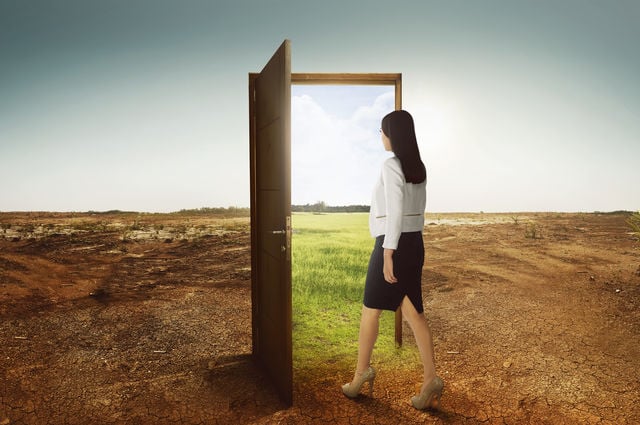Shaping the Future of Hospitality: Continuous Improvements or Radical Changes?
14 experts shared their view
"Will the next 50 years bring the Great Decoupling or the Great Collapse?" [1] All bets are on the former when economies thrive decoupled from greenhouse gas emission. Decoupling must equally occur between societal development and biocapacity. The hotel sector has developed many sustainability and ESG approaches to chart a course of action towards decoupling growth from resource intensity which is known as the Great Decoupling.
And Great Hopes are set on the ability of businesses to innovate.
We are currently experiencing two approaches: those managers that bet on incremental improvements built on familiar technologies and processes [2] and those entrepreneurs that seek radical innovations [3] which are possible game changers on the sustainability front.
Faced with an increasing number of alarming records being broken [4], the pressing question is not whether change needs to happen but how it should unfold - as a process of continuous improvements or as a seismic shift leading to radical changes?
Considering the fragmented nature of the hospitality sector with its complex ownership and management models and reliance on a complex (and impactful) tourism value and supply chain, two questions are asked (feel free to tackle only one question of your choice, or all of course):
- Are incremental improvements of business models and processes a safe bet and sufficient to achieve substantial and required change? (with supporting examples)
- What do you think is/are the radical change(s) necessary in the tourism and hospitality sectors to effectively deal with major sustainability challenges? (with supporting examples)
References
[1] Steffen, W, Broadgate, W, Deutsch, L., Gaffney, O, and Ludwig, C. (2015). The trajectory of the Anthropocene: The Great Acceleration, The Anthropocene Review, 2(1), 1-18. https://doi.org/10.1177/2053019614564785
[2] Schumpeter, J. A. (1934), "The Theory of Economic Development", in Baumol, W.J. (1990), "Entrepreneurship: Productive, Unproductive, and Destructive", Journal of Political Economy, 1990, vol. 98 no. 5. The University of Chicago.
[3] Christensen. C.M., Hall, T., Dillon, K., and Duncan, D. S. (2016), Competition Against Luck. The story of innovation and customer choice, HarperCollins, New York.
[4] United Nations Environment Programme (2023). Emissions Gap Report 2023: Broken Record - Temperatures hit new highs, yet world fails to cut emissions (again). Nairobi. https://doi.org/10.59117/20.500.11822/43922.
Below are some (radical) changes in the tourism and hospitality sectors to deal with major sustainability challenges:
- Smart building systems with sensors and automation. Smart thermostats can adjust room temperatures automatically when guests are not present, and intelligent lighting systems can dim/turn off lights in unoccupied areas.
- Energy independence through the use of renewable sources and water through an elaborate filter technology.
- Authentic cultural experiences that are designed and managed in consultation with the indigenous communities.
- Environmental levy on stays with proceeds aimed to support environmental conservation and rehabilitation initiatives (already applied by Soneva and Seychelles with Bali and Venice following).
- Actions to regulate the number of tourists in destinations with overused resources. Some cases and potential solutions include:
- Machu Picchu, Peru - implementation of a ticketing system with daily limits on the number of visitors;
- Santorini, Greece - introduction of a cap on cruise ship arrivals and a daily limit on the number of visitors to encourage longer stays and the exploration of lesser-known areas;
- Cinque Terre, Italy - implementation of a tourist entry pass system including sustainable transportation options with daily limits.
These examples showcase various actions to balance tourism's economic benefits with destinations' environmental and cultural preservation.
For me, it is not a case of which, it is about marrying the two. When it comes to radical changes or incremental shifts, action was required decades ago, the greatest risk of all is not doing anything. Therefore, the pathway to sustainability requires a thoughtful blend of continuous improvement and radical change. Taking action today reduces risks for businesses and lowers the impact of betting on radical changes if that wait doesn't pay off. Failure to take action now, may mean that when a radical innovation is available, we may not have the funds or capacity to implement. The benefit of incremental change is that it is achievable, that action is underway and that we are playing our part in delivering a better future.
Can incremental change make a difference? EarthCheck certified properties saved the equivalent of 2,611 Olympic swimming pools of water, diverted more than 25,000 shipping containers of waste from landfill and reduced emissions by the equivalent of more than 255,000 cars in one year alone. If every business took this type of incremental action, think about where we could be…….By all means take the innovation and radical action when it"s available, but let"s start today.
While radical change is always a tempting idea, I strongly believe that change toward sustainable hospitality must happen incrementally. Hospitality is driven by profit, and guests need to be - at minimum - receptive to sustainability before change will properly start. For a fundamental transformation of the industry, however, the guest must start expecting true sustainability and express a willingness to pay for like initiatives. Fortunately, first signs of this are appearing in recent research[1]. Room2 in Chiswick, London, offers a practical example of nudging guests toward sustainability by offering them a chance to explore the hotel’s multiple sustainability activities using an information screen placed near the lobby. This represents a gradual step toward creating customer experiences that convey a sense of purpose to guests[2] and, hopefully, eventually can lead to the design of ethically transformative experiences that can alter the consumption behavior of guests permanently after a visit[3]. Such a gradual path to sustainability is much slower and more tedious than a one-off breakthrough would be, but it incorporates the key ingredient, the guest, in the equation. Whether this is enough will then depend on all of us as consumers.
[1] Kuokkanen, H., & Sun, W. (2023). Willingness to pay for corporate social responsibility (CSR): Does strategic CSR management matter? Journal of Hospitality & Tourism Research.
[2] Kuokkanen, H., & Catrett, J. (2023). Ethically meaningful customer experiences: Satisfying an evolving desire for purpose through CSR. Journal of Sustainable Tourism, 31(6), 1464–1481.
[3] Kuokkanen, H., & Kirillova, K. (2024). Ethically transformative experiences in hotels. Annals of Tourism Research, 105, 103709.
What do you think is/are the radical change(s) necessary in the tourism and hospitality sectors to effectively deal with major sustainability challenges? (with supporting examples)
I believe that the franchise model employed by major international hotel chains is a barrier to sustainable hospitality. Why do I say that? Regardless of how comprehensive or robust are the procedural guidelines for major brands, they are just guidelines and not brand requirements, leaving owners to strongly utilize them, partially utilize them, but unfortunately to largely ignore them. It is clear that a minority of owner/managers take comprehensive approaches to sustainable practice, despite having comprehensive guidance mechanisms promoted by the brand. This not only means that these brands underperform on sustainability, but they fail to serve as models and leaders for the greater industry.
Considering the scale, scope and pressing nature of the major sustainability challenges at hand:
1. Are incremental improvements of business models and processes a safe bet and sufficient to achieve substantial and required change? (with supporting examples)
Incremental improvements are indeed a safe bet, but they can only be sufficient if they are part of a larger more holistic plan.
For a lot of other industries, purpose and sustainability have made their way to morning briefings, monthly financial reviews, quarterly performance reviews and yearly reporting with relatable and relevant CSR KPIs that everyone in the company can comprehend and follow. Not only that, but KPI objectives and actions to reach them are planned ahead and made clear to the whole company, with incentives/ bonuses attached, at least in part to reaching these objectives.
We do great things in hospitality, like working with local organic farms, growing fruits and vegetables, implementing plant forward menus, repurposing food waste or turning it into compost, even launching food technology products. And while this can be truly compelling for the market, I see two main issues.
- These initiatives, while fantastic actions to take, are often ad hoc.
- We have no measurables, no data. We have no way of calculating our impact before the initiatives and after their implementation. So while our efforts are exciting, we have no data driven outcome to share.
In order for incremental improvements to have the desired impact, we must ensure sustainability becomes as important as financial returns. This means, putting in place relevant and data driven CSR KPIs, hotel specific objectives to be reached with incentives attached. Actions/ initiatives, however small, should be planned, executed and measured in line with the said objectives.
2. What do you think is/are the radical change(s) necessary in the tourism and hospitality sectors to effectively deal with major sustainability challenges? (with supporting examples)
What is the one thing that is ubiquitous in our industry and that has the highest impact on our planet?
Simply put, FOOD.
In our world, the food we buy and eat is responsible for up to 37% of global greenhouse gas emissions[1]. Working on the food we purchase and serve to our guests is the most impactful change we can make to reduce our impact on the environment. By simply swapping existing ingredients with lower impact ingredients in our recipes we can significantly reduce our impact on the environment.
I’ve made the experience by making a simple apple tartelette and swapping three ingredients, puff pastry for non-dairy puff pastry, ground almond for ground hazelnuts and butter for margarine.
These small changes reduced the carbon footprint from 1.068kg CO2e to 0.571kg CO2e, or a reduction of 47%.
The same thing goes for water consumption, reducing it from a whopping 3.2 m3 to 1.13 m3, or a 65% reduction.
And this can be done to any recipe.
Imagine if the tartelette is sold 1000 times a week, the hotel would be reducing its carbon footprint by close to 26 tons of CO2e and water footprint by close to 108,000 m3.
Plus, the added benefit to doing that is, I was also able to reduce cost by 7% with these same changes.
Focusing on food is the easiest and most radical way to significantly reduce environmental impact in our industry, and it saves money.
[1] Mbow, C. et al. Food Security in Climate Change and Land: an IPCC Special Report on Climate Change, Desertification, Land Degradation, Sustainable Land Management, Food Security, and Greenhouse Gas Fluxes in Terrestrial Ecosystems (IPCC, 2019).
Rosenzweig, C., Mbow, C., Barioni, L. G., Benton, T. G., Herrero, M., Krishnapillai, M., ... & Portugal-Pereira, J. (2020). Climate change responses benefit from a global food system approach. Nature Food, 1(2), 94-97
Related article by Jerome Pagnier
In hospitality, sustainability blends small improvements with transformative actions. Incremental strides, like deploying energy-efficient technologies and adhering to sustainable tourism guidelines, serve as foundational pillars. For instance, refining waste management and instilling sustainable practices among staff represent incremental enhancements.
Simultaneously, the industry must embrace transformative changes by collaborating with local communities, championing responsible and regenerative tourism practices. Take VIRTU Resorts and Residences, for instance, which incorporates wastewater heat recovery systems. While incremental steps involve optimizing wastewater management, a transformative leap entails investing in cutting-edge technologies to reclaim and repurpose heat from wastewater for internal energy needs. This curtails energy consumption and underscores an unwavering commitment to sustainability.
An integration of incremental improvements with transformative shifts establishes a sustainable framework for the industry. This approach resonates with the scale, scope, and urgency of contemporary sustainability challenges, providing a responsible and resilient trajectory.
VIRTU Resorts goes beyond by intertwining its initiatives with local cultures and Indigenous communities, recognizing their integral role in sustainability. Collaborating transparently and ethically, VIRTU ensures fair compensation through partnerships, respect, and contributions to the environment and the community. This collaboration supports sustainable development and amplifies the impact of change initiatives, fostering a more inclusive and effective approach.
Related article by Sandi Lesueur
In the hospitality industry - just like in the business world in general - a paradigm shift is necessary [see NRDC], which calls for radical changes.
I see 3 priorities that are implementable by key hospitality stakeholders if they decide to work together (which can be a radical change for some of them already…):
- Hotel operators and their suppliers: Zero plastic
- Hotel investors and franchisors: Zero land take
- All: choose and aim for new KPIs (Key Performance Indicators) for the industry, before and above financial results, which would inspire hospitality leaders in their mission.
I elaborate on each of them in my opinion article.
Transparency about what is being done, what worked and what didn't in a collaborative mindset is going to be absolutely essential to get to a new era where the hospitality industry contributes to restoring our planet and improving the health and wellbeing of all of its "guests".
Related article by Johanna Wagner
The challenges facing decoupling and green growth in the hospitality industry are evident, with current mainstream practices yielding insufficient progress. However, a departure from the prevalent notion that decoupling and tourism growth can happen simultaneously, coupled with a redirection towards an alternative paradigm of value creation in the form of regenerative hospitality, shows a more promising futureproof path for our industry.
It requires hospitality businesses to venture beyond minimizing the industry"s negative externalities and instead create proactive positive change, promoting resilient social and environmental systems. By applying an "outside-in" organizational perspective, defined by Dyllick and Muff as
finding a match between the world"s environmental, societal and economic challenges and the often hidden core competencies and resources of an organization to respond to these challenges, is what ultimately generates new innovative and futureproof business models that create shared value for all stakeholders.For examples of regenerative hospitality I can recommend the hotels of the Cayuga Collection, a group of award-winning sustainable hotels in Latin America. Their mission is
to protect and preserve the surrounding communities and ecosystems, and enrich the lives of curious travelers, everywhere.
Related article by Malu Boerwinkel
The biggest change the industry needs to address is the mindset. That is in how we build, how we operate, how we report and communicate ESG initiatives, but also in how we think as owners, operators, employees, and as guests. Mindset in how we see a hospitality business should run, the investments we put into sustainability, how we prioritize sustainable building methods, systems, and operations. Equally, the mindset in how we see hospitality stays/experiences. This means, the expectations we have as guests and travelers, Hospitality is an industry and business whose first priority has always been exceeding guest expectations. If guests re-imagine their expectations of what it means to have a holiday/vacation; of what they are willing to accept and experience from hospitality business and shape all their viewpoints to a more sustainable vision; this will naturally push all changes within the industry. The innovations are there, the tools to help us reduce emissions from operations are there, so are tools to help the industry with data collection, carbon emissions, reporting on a global scale are there, however they require more of prioritization than what they have been given to date.
Related article by Marloes Knippenberg
It is fair to say that the hospitality industry is a slow mover when it comes to sustainability. Not much has been done at a global level so far, even on items that are supposed to be easier to implement, like for example the reduction of single-use plastic. I was in the US a couple of months ago and was shocked to see breakfast at a renown international hotel chain served with single-use plastic everything – from cups to plates and glasses.
With the urgency of the climate situation, incremental improvements of business models and processes are not sufficient and take forever to be implemented. More radical changes are necessary and need to be driven by a coalition of the major hotel chains, who have the power and international spread to enforce the changes at a global level. The industry needs a fundamental change that can only happen if all the stakeholders are working together in the same direction, defining the top priorities and targets, and acting on measures simultaneously so there Is no competitive advantage in implementing or not a measure – everyone must do it. Without a coordinated approach, we will still be nowhere close to the sustainability objectives for the industry in the next few years. The industry needs to take control over sustainable change and not rely on governments and countries to force them to be concerned.
The climate crisis will not be resolved easily. Radical change is called for in the tourism and hospitality sector. Annual programs are usually naively optimistic: road maps for climate neutrality, set comfortably far ahead in time. Some economists advocate degrowth instead, and budgeting of resource consumption.
Sustainability goals for hospitality are now familiar: increased energy efficiency and reduction of GHG; reduction in water consumption; reduction in food waste; circular hospitality, and sustainable transport-- with technology promising to help us achieve these goals in time. Add to this the new legal duty to disclose sustainability impacts and the equally challenging societal goals, decent work and equality.
Hospitality professionals focused on cost-effective hospitality operations, may be unprepared for radical change. But hospitality businesses are already challenged when their property is flooded, when destinations are avoided because of extreme weather. Climate resilience means emergency response planning, organizing emergency support, getting relief funding. Climate adaptation and climate mitigation require human collaboration across value chains and in local communities.
Radical change requires that we embrace our responsibility and learn from recent climate science, current events, and best practices, using best technology to minimize our carbon footprint. The world is waiting for us.
Related article by Bastienne Bernasco
Amidst the current socio-economic instability and threats to biocapacity, continuing business without changing our approach to growth is a risk. Often, the potential of SMEs to drive this necessary change is underestimated. While hotel chains have greater impact capacity, they frequently overlook crucial aspects such as new development impacts, resource use, and the lack of contingency plans for inevitable social and environmental events. Effective collaboration among industry stakeholders and having a clearly defined path and measurable outcomes is pivotal. While regulation alone may not solve the issue, it serves as a catalyst by encouraging those within its scope to start quantifying their impacts and driving change. For instance, measuring brand success by the number of new properties in the pipeline without measuring the development's environmental and social impact is one of the biggest threats in our industry. Instead, the focus should shift towards allocating capital to protecting land, restoring ecosystem services, and enhancing the quality of life for communities surrounding existing assets. Creating shared value is fundamental for hotels' long-term success.
Small Steps or Giants leaps?
Do the challenges of sustainability require small steps or giant leaps? Yes. We must commit to both.
We must continue to invest in both incremental changes to improve the efficiency and effectiveness of our current sustainability efforts and seek system changes that will lead to quantum improvements in our results. Any other strategy is just too risky.
Even so, it is important to highlight that the change we need is not just technological – although I’d happily accept a miracle new technology to solve all our problems.
Sustainable tourism is also a social and behavioral problem. We must work to ensure that sustainable, responsible travel production and consumption is the norm. Each time we choose sustainability, we normalize it, shaping it into our culture. Just like the “overnight success” that comes after years of hard work, we will work in small ways to reach the tipping point when responsible and sustainable tourism is expected, and everyday folks will no longer be able to imagine doing tourism as we do it now.
Business As Usual is Not Enough
Indicators on the state of our environment point to the insufficiency of incremental changes in business practices in addressing the pace and magnitude of challenges. Perhaps it is the way sustainability is practiced that needs to be questioned. The greater tourism industry is clearly off-track[1].
Net Positive Requires Some Radicalness
Rather than solely focusing on reducing footprints (negative environmental impacts), the SHINE framework emphasizes increasing handprints (positive impacts)[2]. Traditional footprint metrics might not effectively stimulate beneficial environmental actions. Handprints however highlight the positive change from actions. Businesses with a net positive approach aim to restore and improve the health and prosperity of all stakeholders. Example: the Pathway to Net Positive Hospitality developed by the Sustainable Hospitality Alliance is an action-based blueprint that calls for more than minor modifications; it involves embedding net positive into the very DNA of business strategies[3]. A radical way to significantly contribute to sustainability and regeneration?
References
[1] Tourism Panel on Climate Change (2023). Tourism and Climate Change Stocktake. [Eds. Becken, S. & Scott, D.]. https://tpcc.info/[2] Norris, G., et al. (2021). Sustainability Health Initiative for NetPositive Enterprise handprint methodological framework. https://doi.org/10.1007/s11367-021-01874-5
[3] Sustainable Hospitality Alliance. (2023). https://sustainablehospitalityalliance.org/wp-content/uploads/2023/07/Guide-to-Net-Positive-Hospitality-Pathway-Report-July-2023-v3.pdf














